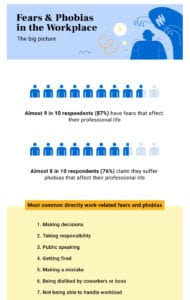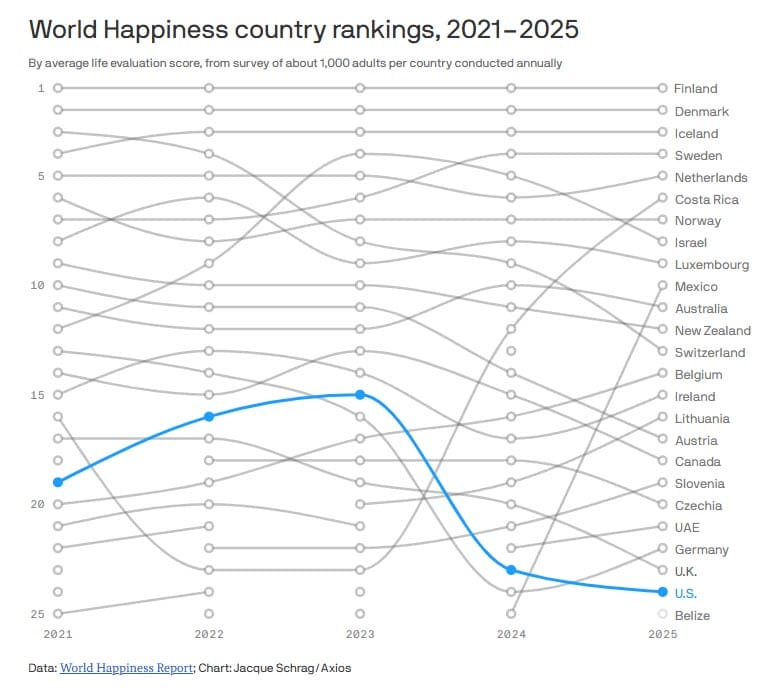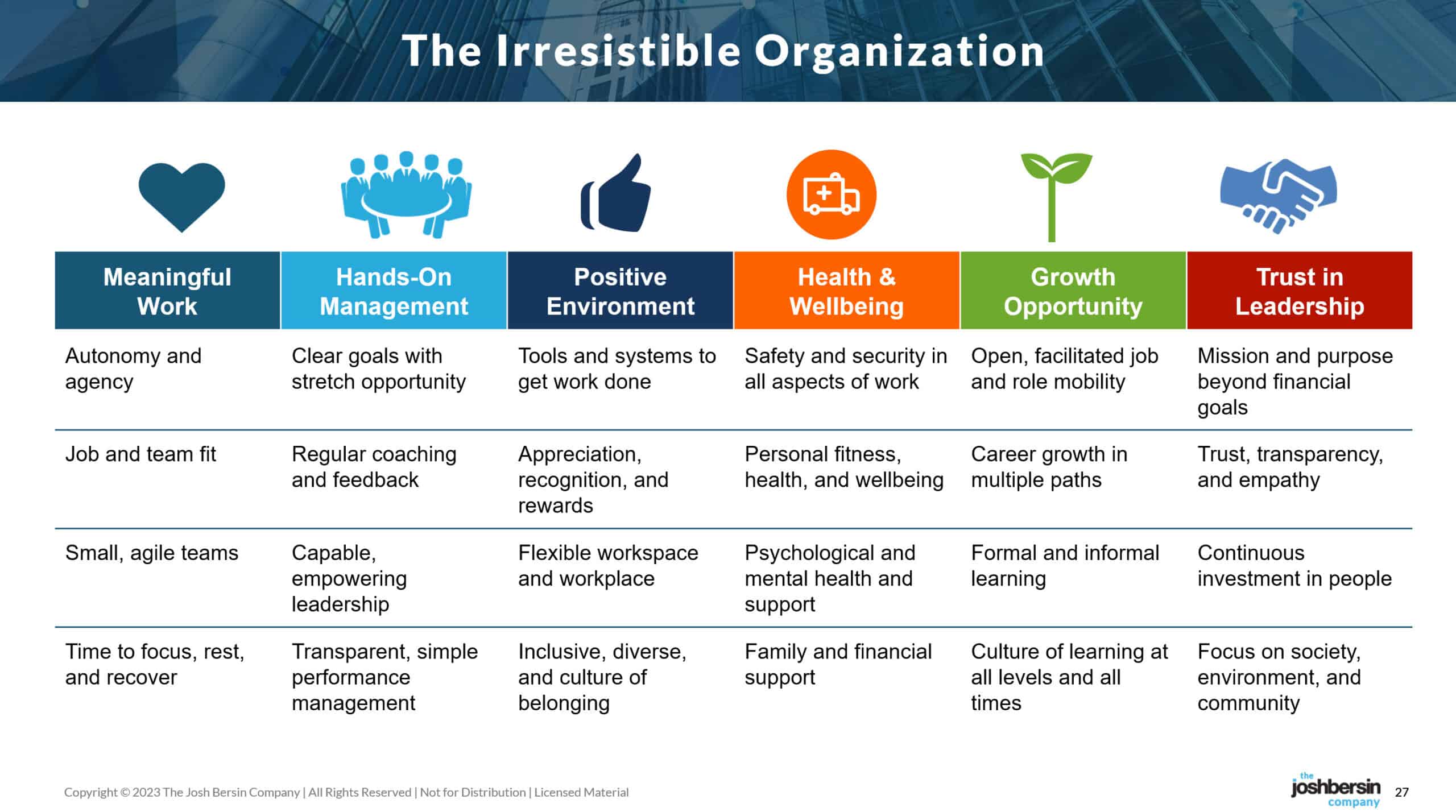Employee Engagement and Happiness Crisis. What Should We Do?
The statistics on employee engagement and happiness are shocking. Gallup’s 2025 data shows that only 21% of workers are fully engaged (down 10% from last year), only 27% of managers are engaged (down 11%), 66% of employees are “suffering,” and 8% are “struggling.”
And there’s more distressing news. The 2025 World Happiness Report shows that US happiness plummeted from 15th in 2024 to 24th in 2025, showing a drop out of the top 20 for the first time. US happiness is just above Poland, Belize, and Taiwan and is now below that of the UK.
And this is not a problem of blue-collar or front-line workers: as the WSJ article “Why Are Managers so Miserable” points out, managers (27% engaged) are 11% less happy than last year and young managers feel the worst. Only a third of young managers received any training at all and their spans of control keep getting bigger.
I believe managers may be the most directly impacted by AI. Not only are they expected to cut staff and increase output, they’re expected to figure out how to “transform” their teams when many are already in over their heads.
 Then there’s the issue of fear. Thanks to DOGE, articles about AI eliminating jobs, and lots of layoffs, 86% of workers express “fear” on a regular basis at work and 34% are afraid to speak up. What are they afraid of? AI taking their job, being left behind, or simply being ignored.
Then there’s the issue of fear. Thanks to DOGE, articles about AI eliminating jobs, and lots of layoffs, 86% of workers express “fear” on a regular basis at work and 34% are afraid to speak up. What are they afraid of? AI taking their job, being left behind, or simply being ignored.
(Adecco’s global study of 80,000 workers found that 40% of employees are worried about job stability, with artificial intelligence cited as the #1 source of this fear.)
Why Is All This Happening?
As I discuss in the video below, the endless stream of surveys and reports on employee and workforce wellbeing comes from a combination of things.
Remote work was “yanked back” just as we got used to flexibility. AI technologists are overselling their tools and convincing CEOs to let people go. And politics and social media have reduced our sense of community, friendship, and kindness.
The World Happiness Report finds six factors in happiness: GDP per capita (wealth), Social support (whether people have someone to count on in times of trouble), Life expectancy (longevity and quality of health), Freedom to make life choices (people’s sense of control and ability to make decisions about their own lives), Generosity (charitable giving, volunteering, and willingness to help strangers), and Perceptions of corruption (perception of corruption in government and business).
When we look at US happiness we clearly see the problem. while our GDP has one up, we have dropped significantly in social support (19% of young people have noone they count on), life expectancy (dropping), freedom (down 15%), and perception of corruption (down almost 20%). Money, as the saying goes, is not our source of happiness.
 |
Anecdotally there are many issues at play: wars rage in Gaza and Ukraine; American politics are entirely polarized; tariff wars pit countries against each other; and business leaders are scrambling to keep up with AI, which now dominates stock market valuations.
If you turn on CNBC on a typical day you see most reporters comparing company performance to that of Nvidia or Microsoft, wondering “how they’ll keep up.” This raises pressures on CEOs, as companies scramble in an uncertain way to re-engineer, transform, or downsize their way to become a “Superworker Company.”
And then there’s the AI pundits, who tell us that “Superintelligence” is soon to appear. As silly as it sounds, this worries people even more.
The 4-Day Workweek? Or the 72 Hour (996) Workweek?
Now let’s get to the issue of stress. Despite our dreams that AI is going to create a 4-day week, tech companies are now going the China route and asking employees to work on Saturdays. This is called 996, 9am to 9pm, 6 days a week, and in a world where jobs are scarce, some employers can enforce this type of rule. (VC’s appear to be a fan of this.)
The truth is, China’s really doing ‘007’ now—midnight to midnight, seven days a week, and they just have a rotational workforce. If you want to build a $100 million company, you can do it on five days a week. But if you want to build a $10 billion company, you have to work seven days a week. – prominent VC
We’ve done exhaustive research on the 4-day week and most academic studies show that productivity (real output per hour) peaks at around 30-35 hours per week. When people work beyond their limits to physical energy they can drink more coffee, but the quality of their work suffers. And software companies are one of the only industries where ongoing bugs are regularly accepted.
I don’t think most of us want a car, airplane, or medical device that was designed or manufactured by someone who worked late on Saturday to finish. Yes, the i-Phone is built on the backs of tired Chinese workers (I urge you to read Apple in China for details), but the company’s focus on quality overcomes the burnout work conditions.
How Do We Deal With These Issues? (From our years of research)
These issues are complex, as our framework shows below. Let me explain some of these topics and I recommend my book Irresistible to help. Note: all the research discussed below and more is available in Galileo and Galileo Learn.
 |
1/ Rethink the “Financial First” Focus
Let’s start with the basics: is your only business purpose to make money? If so, you may lose sight of the fact that “enduring organizations perform best for shareholders.” Invest in human capital and you’ll find it’s the only appreciating asset you have (machines and even software wears out).
2/ Refocus on Purpose with Accountability
The best companies we meet have a strong balance between “purpose” and “accountability.” They have a relentless focus on their products and customers, but also hold each other accountable.
Several of our clients recently told me their cultures are “too nice.” People don’t want to have difficult conversations, so performance issues go unresolved. The best answer I heard was to use the exercise concept of “Time under Tension,” where you force people to talk with each other when things aren’t going well.
3/ Try Not To Over-Hire
As we discuss in our Systemic HR research, too many companies think all problems can be solved by hiring the next expert. Not only is this very expensive but most “experts” don’t stick around. Yes we want to build Talent Density, but you can find high powered people inside your company without constantly looking elsewhere.
4/ Invest Generously In Development
The average company only spends $1200-1500 per year on each employee’s development. Make sure this is spent well (it’s typically 1.5-2% of payroll) and don’t waste it on piles of courses nobody will use. We suggest you use a dynamic learning model, now available in Galileo Learn and other emerging platforms (read The Revolution in Corporate Learning).
Learning improves productivity, quality, innovation, and engagement. So think of developmental assignments, gig projects, job rotation, and flexibility as opportunities for learning, growth, and productivity improvement.
5/ Become a Dynamic Organization: Enable People To Change Roles
Now that AI has arrived, we’re all struggling with job changes, new roles, and new business processes. PwC’s CEO survey supports our Dynamic Organization research: companies that regularly move people around are 27% more profitable than those that don’t. And people in those companies are more engaged, happy, and productive.
6/ Pay People Fairly, Not Just Well
Of course pay matters, but you’d be surprised to find it’s not as important as you think. Our research on pay equity found that fairness and transparency in pay is seven-times more important than level of pay. So think about your pay process and make sure you’re keeping pay current with local cost of living, skills-based pay, and the job market.
On the topic of wellbeing, make sure you’re aware of local benefits needs – a “gym membership” in one city maybe far less valuable than a “physical therapist allowance” in another role.
7/ Learn to Appreciate, Thank, and Recognize People
Human beings are not machines: we all strive to be appreciated. A small thanks, a formal recognition, and even a robust social recognition platform can really change how your company works. Organizations who constantly ask for more, and rarely reward the staff, are always suffering from burnout. You can avoid this with a simple focus on kindness. My podcast with Eric Mosley, CEO of WorkHuman, will blow your mind. Our research shows that companies with high-recognition cultures have a 70% lower voluntary turnover rate than their peers.
8/ Practice Corporate Citizenship
While it’s not in vogue at the moment, please consider that you, as a private sector leader, have citizenship responsibilities. How we treat our employees, business partners, supply chains, and communities really matters. And this includes things like DEI, community involvement, belonging (intersectionality), and what we call “employee activation” (listening).
Great companies are also great citizens, and these investments form the basis of happiness, fulfillment, and meaning for employees. (Read Citizenship at Work and other articles for more.)
9/ Embrace Forgiveness, Flexibility, and Inspiration
Finally, let’s remember the foundation of Human Centered Leadership.
We are people, not machines. We need rest, we have emotions, we are sometimes fragile, and we do make mistakes. Yes, we want people to perform, but as we learned during the pandemic, taking care of people is the best way to take care of the business.
10/ Yes, Employee Engagement Does Matter
Final point. As I describe in Irresistible, there is a bell curve of employee engagement in companies. While the average is 3.4 out of 5, many perform much higher. These Irresistible Organizations consistently outperform their peers over long periods of time. So if you want your business to endure, take care of your team.
 |
How to Learn More
Our new HR and leadership academy, Galileo Learn, includes more than 700 courses, videos, and an AI “Josh” you can ask questions about any of these topics. Join Galileo Learn (and check out the Galileo Agent, which connects to Learn), and you can bring these important ideas to leaders throughout your company.
Let’s make work an enjoyable, fulfilling experience for everyone.
